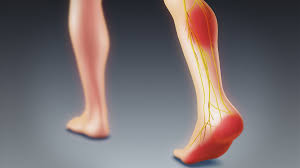Nerve swelling in the foot can be a painful and frustrating condition that affects your mobility and quality of life. It's important to understand the causes, symptoms, and treatment options available. In this article, we'll explore what nerve swelling in the foot is, common causes, and ways to manage and prevent it.
Nerve swelling in the foot, often referred to as a neuroma, occurs when the tissue around a nerve becomes inflamed. This can lead to symptoms like burning, tingling, or a pinching pain in the foot. The most common type of neuroma in the foot is called Morton's neuroma, which typically affects the ball of the foot.
 Causes of Nerve Swelling
Causes of Nerve Swelling
Understanding the causes of nerve swelling in the foot can help you prevent and manage the condition more effectively. Here are some common causes:
Footwear Choices
Wearing tight or ill-fitting shoes can compress the nerves in the feet, leading to swelling and pain. High heels, narrow shoes, and shoes that lack proper support can all contribute to nerve problems. Opting for wide shoes or supportive shoes can help alleviate pressure on the nerves.
Repetitive Stress
Activities that put repetitive stress on the feet, such as running or jumping, can cause irritation and swelling of the nerves. This is especially true if you are not wearing appropriate footwear that provides adequate support.
Foot Abnormalities
Certain foot abnormalities, like high arches or flat feet, can increase the risk of nerve swelling. These conditions can alter the way weight is distributed across the foot, putting extra pressure on the nerves.
Medical Conditions
Some medical conditions, such as diabetes, can contribute to nerve swelling in the foot. Diabetic neuropathy is a common complication of diabetes that affects the nerves in the feet, causing pain and discomfort.
 Symptoms of Nerve Swelling
Symptoms of Nerve Swelling
Identifying the symptoms of nerve swelling early can help you seek treatment promptly. Common symptoms include:
-
Burning or tingling sensation in the foot
-
Pinching pain in the foot, particularly in the ball of the foot
-
Numbness or a feeling of having a pebble in your shoe
-
Swelling or a lump in the affected area
These symptoms can vary in intensity and may worsen with activity or prolonged standing.
Diagnosing Nerve Swelling in the Foot
If you suspect you have nerve swelling in your foot, it's important to consult a healthcare professional for an accurate diagnosis. Your doctor may conduct a physical examination and ask about your symptoms and medical history. Imaging tests, such as X-rays or MRIs, may also be used to rule out other conditions.
Treatment Options
There are several treatment options available for managing nerve swelling in the foot:
Conservative Treatments
For mild cases, conservative treatments can be effective. These may include:
-
Resting the affected foot to reduce pressure and inflammation
-
Applying ice packs to the swollen area to alleviate pain
-
Using over-the-counter pain relievers to manage discomfort
Footwear Modifications
Switching to footwear that provides better support and fits properly can significantly reduce symptoms. Look for shoes with a wide toe box, cushioned soles, and good arch support. Diabetic shoes and neuropathy shoes are specially designed to accommodate foot conditions and provide extra comfort.
Orthotics and Padding
Custom orthotics or shoe inserts can help redistribute pressure on the foot and relieve stress on the nerves. Padding can also be used to cushion the affected area and prevent further irritation.
Medical Interventions
In more severe cases, medical interventions may be necessary. Your doctor may recommend:
-
Corticosteroid injections to reduce inflammation
-
Physical therapy to improve foot mechanics and reduce stress on the nerves
-
Surgery to remove the affected nerve if conservative treatments are unsuccessful
Preventing Nerve Swelling in the Foot
Taking steps to prevent nerve swelling can help you maintain healthy feet and avoid discomfort. Here are some preventive measures:
-
Choose footwear that fits well and provides adequate support
-
Avoid high heels and shoes with narrow toe boxes
-
Gradually increase the intensity of physical activities to avoid overuse
-
Maintain a healthy weight to reduce pressure on the feet
Conclusion
Nerve swelling in the foot can be a challenging condition, but with the right knowledge and treatment, you can manage it effectively. By understanding the causes and symptoms, choosing appropriate footwear, and seeking medical advice when necessary, you can alleviate pain and improve your quality of life. Remember, taking care of your feet is an essential part of maintaining overall health and well-being.








